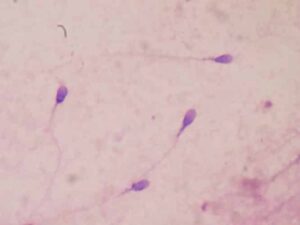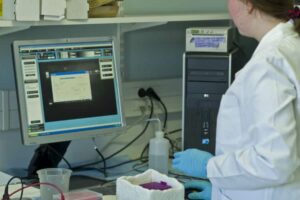À travers les trois billets précédents traitant de l’infertilité, vous avez pu acquérir maintes informations pouvant vous éclairer sur diagnostic lui-même de l’infertilité, des facteurs de risques à la fertilité puis des tests que les femmes en investigation pourraient être susceptibles de passer pour mieux comprendre la problématique de conception spontanée.
In the three previous articles about infertility, you have learned about an infertility diagnosis, risk factors and tests women can take to understand their reproductive issues.
However, fertility issues affect both men and women. This is why I want to talk about the different tests men may have to take when facing infertility issues.
50% of men will have fertility problems, and unfortunately, we know that they consult very late, wait longer before starting the testing process. Many will refuse to believe the doctor when they diagnose infertility because it affects their masculinity, their ability to make life, produce offspring.
A man’s masculinity can be affected, and they will need time to accept it like they have to go through the mourning stages. Some will do so better than others. Men may have depression, anxiety, sleep issues and sexual problems.
Male fertility disorders are a medical problem, not a personal one. It is a physiological issue, usually regarding the production of a necessary quantity and quality of sperm. To better understand what the problem is, you have to go through a range of tests that will help health professionals understand what is preventing reproduction.
Below are sample tests that will likely be requested for men, but there may be others.
Physical Exam
When starting the process, health professionals need sufficient information to understand the man’s situation.
A man will be asked about their history, asked questions about their lifestyle habits, general health, health history, heredity, etc.

Using this information, professionals can uncover risk factors that can increase infertility, such as smoking, drug use, anabolic steroids, poor diet, or chronic stress. A man’s profession may also contribute to their infertility. They may also be asked about previous surgeries or trauma to the testicles, cancer, or infections including sexually transmitted diseases.
A full physical exam, including of the testicles and the vas deferens, will be completed by the doctor to look for clues, issues that can be used to make a more precise diagnosis.
Semen Analysis
Semen analysis is an easy, non-invasive test using a semen sample after masturbation, ideally after several days of abstinence.

A full analysis of the semen sample will be done with a microscope to evaluate specific elements. This test provides different types of information, including sperm concentration per millilitre, mobility, vitality and form. The presence of antisperm antibodies can also be checked as it can be a fertility factor.
Since semen can vary from one ejaculation to another, men should expect to repeat the semen analysis several times to check for differences between samples. However, even if this test helps evaluate male fertility, it doesn’t tell the whole story. 15% of male infertility causes will remain unexplained.
Hormonal Levels
A hormonal problem can be the source of reproductive difficulties.
Male bodies are also managed by a range of hormones that have a role in its different functions. Regarding reproduction, the hormones that are evaluated in the blood will be very similar to women’s.
FSH and LH are essential for men to send orders to the testicles to produce sperm. That is why their levels can inform the professional when checking for reproductive problems. There is also estrogen, TSH produced by the thyroid gland, and prolactin which will be tested as they play a role in male reproduction.
Males will also have their testosterone measured because it has a significant influence on the production of sperm in the testicles and their form.
DNA Analysis (Karyotype)
Fertility specialists can request a Karyotype of sperm to study the chromosomes that make it up. This might indicate that genetic issues are the source of the reproduction problem or repeated miscarriages.
Sperm has DNA, the molecule that carries the male’s hereditary genetic baggage. This sperm will meet the egg carrying the woman’s DNA. A happy mix takes place during fertilisation. If there is a manufacturing defect or malformation, conception may be compromised, or if fertilisation has taken place, the survival of the embryo.
Ultrasound
An ultrasound of the male genital tract may take place to see if there are blockages or malformations present.
All these tests will help you better understand the man’s situation when facing fertility issues. If an issue is identified, there are solutions available that can bypass the problem using techniques associated with assisted human reproduction.
S’il y a un trouble identifié au niveau de la fertilité au masculin, des solutions peuvent être proposées pour contourner ces difficultés par l’utilisation des techniques rattachées à la procréation médicalement assistée.
Marie
The Baby Expert



